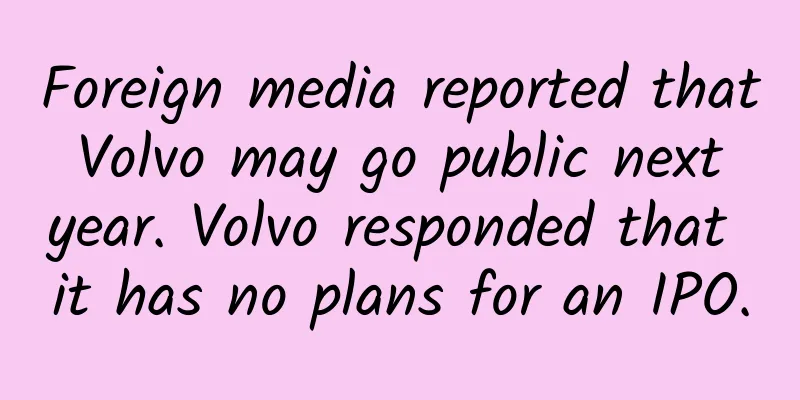Facebook is out of fashion, Twitter is dying. How do American college students view the 12 major social networks?
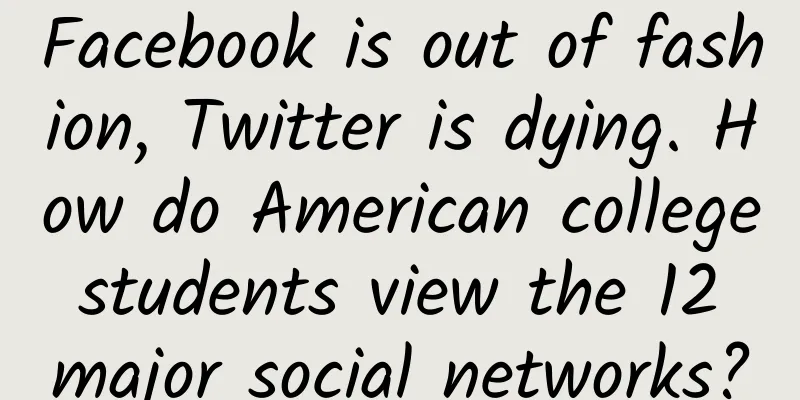
|
This may be the best analysis of social networks. This 19-year-old American boy analyzed Facebook, Instagram, Twitter, Medium and other social networking platforms one by one, and summarized the functions and atmosphere that he and his peers like. According to his description, the most important thing for young people is the lack of social pressure: users will not feel anxious because no one likes their posts, nor will they feel uneasy because their photos are seen by their parents or employers. The former is represented by Snapchat, and the latter is represented by Tumblr. If you meet a lot of young people aged 15-20 during your family visits during the National Day holiday, you might want to ask them what they think of China's social networks. In addition to services that everyone knows about, such as QQ and WeChat, are there any niche communities that are emerging? Why do they like them? How many people around them are using them?Many technology articles are keen to analyze the young audiences active on major social platforms. However, few young people participate in such discussions and make their own voices heard. Therefore, I would like to share some of my views. I am a 19-year-old male student at the University of Texas at Austin who is interested in studying the role and function of social media in our society. The opinions expressed in this article are based on my own observations and those of my peers. I’m not going to use any academic research or survey data. That’s easily available from tech news. I’m just trying to express a different perspective on our highly engaged audience. Of course, there will be some data that doesn’t match my opinion, but that’s just what I’ve noticed. Below is my analysis of various social networking platforms based on my years of observation and understanding: Facebook: Awkward but Can't Leave Simply put, Facebook is hardwired into our brains. We started using it in middle school because it was cool, but now it seems more like an awkward family dinner that we can’t leave. Facebook is no longer just a social tool. If you don't have Facebook, you will often feel strange looks from others. "Everyone is using Facebook, why don't you?" is the most common social pressure. You have to prepare a set of standard answers. When classmates and friends ask this question, recite it quickly in front of them. (In the end, you still give up: Forget it, I'll just apply for a Facebook!) Most of us use Facebook because of its group feature. I know many students who only go to Facebook to check the groups they join and then quickly exit. Facebook's group feature does not have a complex algorithm like the Newsfeed feature. It just makes it very convenient for you to see the new information posted by the group without having to sift through a large number of posts and ads that you don't care about. Facebook's Messager feature is also popular among young people, mainly because it provides a new way to communicate with people who are not convenient to call but can send messages. Facebook is used by many people as a social media profile because everyone around them is using it. If I met you at a party, I won't go to Twitter or Instagram to find out about you. Facebook's simple and powerful search allows you to find people you want to meet (Instagram's search function is not as good. Although it has improved in the latest version update, it still needs to be improved) Instagram: The most used “social media display platform” Instagram is the most used social media display platform for people of our age. Please note that I used "social media display platform". What I mean is that although many people are on Facebook, we post things on Instagram. Take me as an example: I have 1,500 friends on Facebook, and I can only get 25 likes on Facebook when I post a photo; however, I can get 253 likes on Instagram (I have 800 followers on Instagram), which is also drunk! Why is this the case? Here are my thoughts: I don’t worry about the content I like or comment on on Instagram appearing in other people’s Newsfeeds and being screenshotted as being liked or mentioned by me. I don’t feel pressure to follow back on Instagram because I’m mostly subscribed to stuff I actually want to see. I’m willing to go back and scroll through stuff I like, rather than having to search for a needle in a haystack. The content on Instagram is usually of high quality. People spend time editing their pictures with various filters, using different brightness and contrast (which is just one step in posting a photo), etc. to achieve the best effect. This means that the content on Instagram is usually better (such as photos), and I am more willing to watch it. Instagram doesn’t have too many older people (not everyone has Instagram), it’s more trendy and cool for the younger crowd - if you have a smartphone, you’ll definitely use it. Even if you don’t take photos, you can tag others in your photos. Plus: tags. I don’t have to constantly check Instagram to make sure I’m not in any embarrassing or ugly photos. Simply put, Instagram won’t let my followers see those ugly photos, making the whole experience more private. As for those ugly photos being seen by another person’s followers? Who cares—I can even delete the tag if I really don’t want others to see it. People don't post 10,000 times a day on Instagram. A lot of people post more moderately, maybe once a day, a few times a week, etc. So Instagram isn't flooded with content every time I open it. I can keep up with the accounts I subscribe to. No links on Instagram means I’m not constantly bombarded with the same ads, bad gossip, or Buzzfeed’s “28 Cool Things You Didn’t Know About Your Dog” listicles. The above is why my peers prefer Instagram to Facebook. The former is less commercialized and more focused on content, so more teenagers will start using it. People are happy to use it, and they are more willing to like and interact with posts. All of this increases the interaction between users and the app, creating a virtuous cycle. Facebook will have all the pictures we've taken, good or bad. Whereas Instagram will just have a snapshot of our activities, more curated, and people actually spend more time taking pictures, making them more relevant and interesting. On Facebook, we'll just post all the pictures and let people tag us, to let our families know we're still alive. A lot of the teens younger than me (10-16) that I’ve talked to about this don’t even have Facebook yet, they just have Instagram. Twitter: Few and Hard to Find Friends on It Many of us simply don't understand the essence of Twitter. Every school has a Twitter fan group that tweets religiously, another group that just reads or retweets, and many more that don't use it. We rarely (and hard to) find friends on Twitter. Many people just use it to complain about school because parents and family (and possibly employers) won't see it. Twitter is a social platform for following or being followed by random people. Although many people now add their real names to their IDs (this will be very important in the future). Your tweets will also be easily searchable, which is a good thing. But speaking too recklessly may affect your work - what if your complaints about your boss are seen by him one day? There are three main groups of people on Twitter: those who use it to complain/express themselves, those who use it to write posts for future employers, and those who just watch or occasionally respond. Snapchat: A more intimate social network for friends Snapchat is quickly becoming the most used social media, especially with the launch of the My Story feature. If you were to break down your party into social media language, it would look something like this: On Snapchat, you upload a series of photos of yourself getting ready for a party, on your way to the party, during the party, leaving the party, and waking up the morning after the party. On Facebook, you'll post cute, posed photos of yourself and your friends at a party, surrounded by a few candles (no alcohol, of course). On Instagram, you pick the cutest photo of yourself. On Snapchat, we can be ourselves because there is social recognition for ourselves. Snapchat does not bring users the social pressure of competing for the number of fans on Facebook, nor will they be followed by random strangers. It is a more intimate network among friends - how do you define intimate? At least they don't mind how crazy I have fun at the party. No other social media (including, perhaps, Twitter) would accept a photo post like “I’m so bored”, but Snapchat does. You don’t have to worry about likes or comments on your posts on Snapchat, because there are none of those features. This makes it very freeing and addictive. If you post a photo on Instagram or Facebook and it doesn't get any likes within 15 minutes, you'll delete it. But Snapchat is completely different. It's really focused on writing your daily story. There are no filters, no editing, no selection. It's just who you are. Another thing about Snapchat, I only know a few people (myself included) who believe that Snapchat actually deletes your photos. Others believe that Snapchat has some confidential database somewhere with all your photos. This is up for debate. But to be honest, most young people really don't care about so-called "security issues" such as "photo leaks". We don't put up social security cards, we just post some selfies and funny pictures with 5 chins. Tumblr: Secret Societies Remember how we described Twitter? "Twitter is a social platform for following and being followed by random people. Each ID is followed by a real name." Tumblr is very similar to Twitter, but few people write their names. It's like a secret community: many people around are using it, but no one is talking about it. On Tumblr, you can be yourself and meet people who share your interests. People don't judge each other's behavior - there is no real-name verification, so you can be who you want to be. I only know the Tumblr URLs of my best friends, and they only know mine. Plus, if you're on Tumblr and someone finds you, you can easily change your URL. Your name isn't tied to your profile in any way, so it's hard to find you without your URL (which helps protect your parents from snooping). People can post freely and support others, and there's a lot of interaction and reposting because people simply subscribe to things they care about (and are more likely to like and repost as a result). I don't think there's a lot of "social" stuff on Tumblr, but it's really easy to meet people from all over the world who share the same interests. This makes many teenagers obsessed with joining Tumblr and making new friends. Yik Yak: The next social giant? Yik Yak is a new competitor that a lot of my college friends use. It's fun because it's all about content - no followers, no profiles, no nothing. Anything interesting and relevant will be on the top of the page, and everything else will be relegated to the bottom, whether it's from Kanye West or some random kid who doesn't say a word in class. I often see Yik Yak ads on Twitter that say “Everyone is here before class”. I am 100% sure that this is true. And even during class, students are talking about the class they are taking. After class, everyone is on Yik Yak to find out what fun things to do in school. Although it is not as popular as other social platforms, Yik Yak is indeed a strong competitor. Many software, such as Secret, which focuses on self-destructing messages, are just thunder and thunder with little results. But my classmates have been recommending Yik Yak to each other, sending screenshots of it, and having a lot of fun with it. But Yik Yak has a drawback: it is less active during holidays. Yik Yak only reaches users within a 10-mile radius. If few people around you use it, you are less likely to use it. This problem does not happen with other social apps. Medium: A practical blogging platform I have many friends who want to start a blogging platform, but their first choice is always WordPress. But for some reason, WordPress is more like a website building tool than a blog. Therefore, once they learned about Medium, they all started to choose it without hesitation. One thing that Medium does well is the “recommend” feature. WordPress doesn’t have these features (including the traditional sharing buttons on websites), which makes Medium more like a community than just a group of individual websites. Medium also has a “follow” system that allows you to browse and read frequently even if you don’t write blogs. It also has a feature that allows you to comment directly in the article (not just at the end of the article). The challenge for Medium comes from how to let young users know about it. All its design and content are already in place, and all that needs to be done is to let more teenagers know about this product. From my personal point of view, more teenagers will know about Medium and write blogs there in the future. other Here are some other social platforms: LinkedIn - You have to use it, so use it. Many people don't realize this until they are in college (or maybe it should be so, after all, it's not for this age group) Pinterest - Mainly for women, and focuses on trends and fashion. Not many people talk about it. Kik - I guess it's a Twitter-based chat app? I don't know anyone who uses it. I just heard its name once as a joke, "Do you have Kik?" - if someone asks this, it's probably because they want to hang out but don't have a partner. WhatsApp - I downloaded it when I went abroad, used it for a while and then went back to iMessage and Facebook, then deleted WhatsApp. Many people use it to communicate with friends abroad, but I think Facebook messages have begun to replace it. But for international students, WhatApp is still very useful. GroupMe - A popular group chat app in college. Everyone has it and loves it. It supports GIFs, can like other people's messages, and can even change your name between different groups, which makes it useful and fun. GroupMe works on any phone and device, desktop, iPhone, Android, or text messaging on non-smartphones. As a winner of Toutiao's Qingyun Plan and Baijiahao's Bai+ Plan, the 2019 Baidu Digital Author of the Year, the Baijiahao's Most Popular Author in the Technology Field, the 2019 Sogou Technology and Culture Author, and the 2021 Baijiahao Quarterly Influential Creator, he has won many awards, including the 2013 Sohu Best Industry Media Person, the 2015 China New Media Entrepreneurship Competition Beijing Third Place, the 2015 Guangmang Experience Award, the 2015 China New Media Entrepreneurship Competition Finals Third Place, and the 2018 Baidu Dynamic Annual Powerful Celebrity. |
<<: Is it possible for Apple's A series processors to integrate Intel baseband?
>>: Business Week: How did Didi Chuxing squeeze Uber out of China?
Recommend
These days, the whole world is paying attention to this monkey! How does the graphics card light up every frame of fantasy on the journey to the West?
At 10:00 am on August 20, the domestic game "...
Landing on a rogue planet? Humans are looking for new ways to migrate across the stars
Recently, American scholars proposed an idea for ...
Play with the Tantan-like card-style sliding effect
Talking about the historical origin of this blog,...
Byton plans to conduct an IPO, having previously obtained the qualification to build a car for 1 yuan
On October 29, Beijing time, Carsten Breitfeld, C...
Can blood type predict cancer? What you never expected is...
Expert of this article: Song Yingwei, Chief Techn...
Plants with flowers are not necessarily "flowering plants"
Produced by: Science Popularization China Author:...
Google abandons Web Environment Integrity API proposal
Google announced that it was abandoning its contr...
How to use short videos to direct traffic to the live broadcast room!
This is a relatively hardcore article. In additio...
The legendary car is no longer popular, SAIC-GM-Wuling is facing a cold winter
In the past, SAIC-GM-Wuling relied on its price a...
Lanzhou WeChat ID photo mini program function, how to make the standard ID photo mini program?
WeChat Mini Programs have been online for more tha...
Can you let yourself go after the test turns negative? Experts urgently remind →
What does it mean to recover from COVID-19? Can y...
Practical Tips | How to create an April Fools' Day event with 500,000 PVs in 3 days with 1,000 yuan!
The biggest phenomenon-level event on April Fools...
Helmets are far from enough. Virtual reality is about comprehensive strength.
In 2015, with the bombardment of information from...
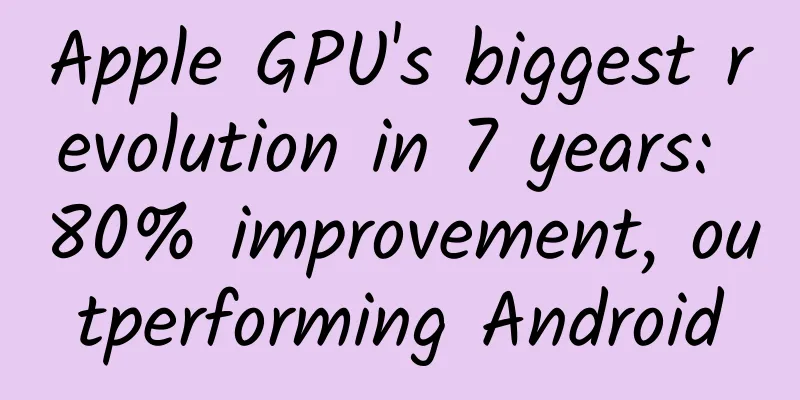


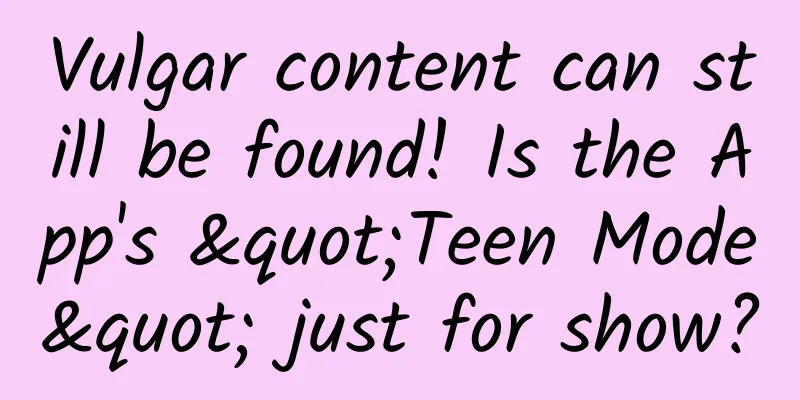


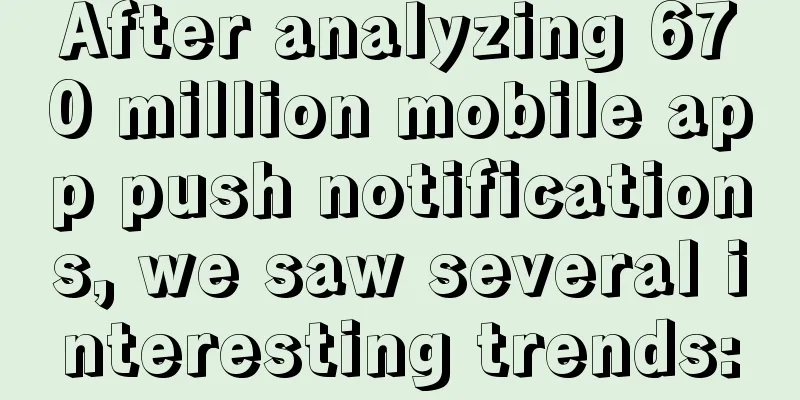

![Zhuorang Xianyu Xiaobai five-day training camp, one hour a day, make money easily and faster [video course]](/upload/images/67cc288bd88d5.webp)
